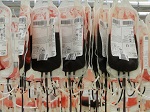
One of the challenges for medicine is how to help people who need a new organ. Waiting on one is often a vain effort. An average of seventeen people die daily waiting and a new person goes on the waiting list every nine minutes. And it's worse than that because a ready organ won't work if the size is wrong or the blood type is off and the body rejects it.
Remember, human blood types are A, B, AB and O. These are based on antigens which are attached to and mark the blood cell types. Type O doesn't have antigens which means those organs can go to any patient. The other blood types must be matched limiting who they can go to.
A new study has found a possible way to convert all blood types to the universal or O type. Researchers looked and found two enzymes naturally occurring in our guts that removes antigens on cells. So, researchers tested the enzymes on a set of donated lungs with type A blood. After just one hour, ninety percent of the A antigens were removed. After four hours, ninety seven percent were gone. That's phenomenal!
Next, they'll test the enzymes on Type B antigens. If successful, all donated tissue could one day be converted to universal organs. Studies are already planned to transplant the converted Type A lungs into studies with mice and pigs.
A new machine will be able to not only oxygenate the lungs for surgery, it will use the enzyme discovered in the study to convert the lungs to the universal type.
More Information
Siamese Cats Researchers Want to Create 'Universal Donor' Lungs
An experiment to change the blood type of donated organs could be a first step to shortening transplant wait times...
Ex vivo enzymatic treatment converts blood type A donor lungs into universal blood type lungs
A major challenge in lung transplantation is the need for ABO blood group matching. To address this challenge, Wang et al. used two enzymes, FpGalNAc deacetylase and FpGalactosaminidase, to convert blood group A lungs to blood group O lungs during ex vivo lung perfusion. The authors demonstrated successful removal of blood group A antigen with no overt changes in lung health. In an ex vivo simulation of transplantation, the authors showed reduced antibody and complement deposition, suggesting that this technique may reduce antibody-mediated injury in vivo. Together, these findings have the potential to improve fairness in lung allocation for transplantation...